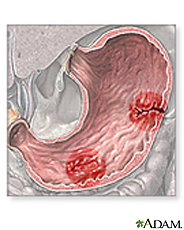
08/23/2016 08:44 AM EDT

Source: National Institute of Diabetes and Digestive and Kidney Diseases - 
Related MedlinePlus Page: Peptic Ulcer

Related MedlinePlus Page: Peptic Ulcer
08/23/2016 08:44 AM EDT

Source: National Institute of Diabetes and Digestive and Kidney Diseases - 
Related MedlinePlus Page: Peptic Ulcer

Related MedlinePlus Page: Peptic Ulcer
08/23/2016 08:44 AM EDT

Source: National Institute of Diabetes and Digestive and Kidney Diseases - 
Related MedlinePlus Page: Peptic Ulcer

Related MedlinePlus Page: Peptic Ulcer
08/23/2016 08:44 AM EDT

Source: National Institute of Diabetes and Digestive and Kidney Diseases - 
Related MedlinePlus Page: Peptic Ulcer

Related MedlinePlus Page: Peptic Ulcer

National Institutes of Health
Languages
A peptic ulcer is a sore in the lining of your stomach or your duodenum, the first part of your small intestine. A burning stomach pain is the most common symptom. The pain
- Starts between meals or during the night
- Briefly stops if you eat or take antacids
- Lasts for minutes to hours
- Comes and goes for several days or weeks
Peptic ulcers happen when the acids that help you digest food damage the walls of the stomach or duodenum. The most common cause is infection with a bacterium called Helicobacter pylori. Another cause is the long-term use of nonsteroidal anti-inflammatory medicines (NSAIDs) such as aspirin and ibuprofen. Stress and spicy foods do not cause ulcers, but can make them worse.
To see if you have an H. pylori infection, your doctor will test your blood, breath, or stool. Your doctor also may look inside your stomach and duodenum by doing an endoscopy or x-ray.
Peptic ulcers will get worse if not treated. Treatment may include medicines to reduce stomach acids or antibiotics to kill H. pylori. Antacids and milk can't heal peptic ulcers. Not smoking and avoiding alcohol can help. You may need surgery if your ulcers don't heal.
NIH: National Institute of Diabetes and Digestive and Kidney Diseases
- MedlinePlus: Gastrointestinal Bleeding
 (National Library of Medicine)Also in Spanish
(National Library of Medicine)Also in Spanish  Symptoms and Causes of Peptic Ulcer Disease
Symptoms and Causes of Peptic Ulcer Disease  (National Institute of Diabetes and Digestive and Kidney Diseases)
(National Institute of Diabetes and Digestive and Kidney Diseases)
 Diagnosis of Peptic Ulcer Disease
Diagnosis of Peptic Ulcer Disease  (National Institute of Diabetes and Digestive and Kidney Diseases)
(National Institute of Diabetes and Digestive and Kidney Diseases)- Fecal Occult Blood Test and Fecal Immunochemical Test (American Association for Clinical Chemistry)
- Helicobacter pylori Test (American Association for Clinical Chemistry)
- Upper GI Endoscopy
 (National Institute of Diabetes and Digestive and Kidney Diseases)Also in Spanish
(National Institute of Diabetes and Digestive and Kidney Diseases)Also in Spanish - Upper GI Series
 (National Institute of Diabetes and Digestive and Kidney Diseases)Also in Spanish
(National Institute of Diabetes and Digestive and Kidney Diseases)Also in Spanish
 Treatment for Peptic Ulcer Disease
Treatment for Peptic Ulcer Disease  (National Institute of Diabetes and Digestive and Kidney Diseases)
(National Institute of Diabetes and Digestive and Kidney Diseases)
- Helicobacter pylori and Cancer
 (National Cancer Institute)Also in Spanish
(National Cancer Institute)Also in Spanish
- Zollinger-Ellison Syndrome
 (National Institute of Diabetes and Digestive and Kidney Diseases)
(National Institute of Diabetes and Digestive and Kidney Diseases)
- Stomach ulcer
 - EncyclopediaAlso in Spanish
- EncyclopediaAlso in Spanish
- ClinicalTrials.gov: Duodenal Ulcer
 (National Institutes of Health)
(National Institutes of Health) - ClinicalTrials.gov: Peptic Ulcer
 (National Institutes of Health)
(National Institutes of Health) - ClinicalTrials.gov: Stomach Ulcer
 (National Institutes of Health)
(National Institutes of Health)
- American College of Gastroenterology
- Find a Gastroenterologist (American College of Gastroenterology)
- National Institute of Diabetes and Digestive and Kidney Diseases

- Peptic Ulcers (Nemours Foundation)
- Ugh! Ulcers (Nemours Foundation)
- Ulcers (Nemours Foundation)
- Culture - duodenal tissue Also in Spanish
- Peptic ulcer Also in Spanish
- Stomach acid test Also in Spanish
- Tests for H. pylori Also in Spanish
- Zollinger-Ellison syndrome Also in Spanish


































No hay comentarios:
Publicar un comentario